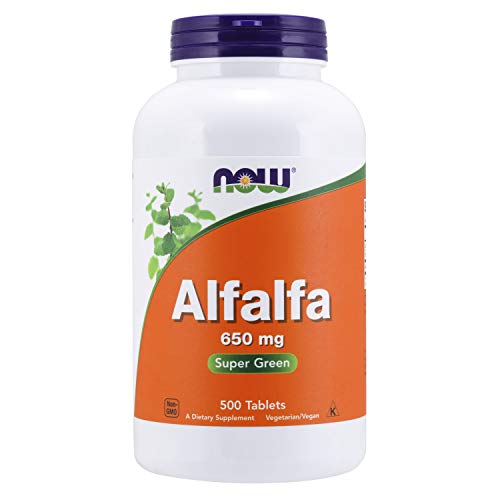Alfalfa (Medicago sativa) is a perennial plant from the Fabaceae family, which is cultivated almost everywhere. The leaves, seeds and sprouted seeds of the plant are used for food and medical purposes. As food or supplement alfalfa is considered one of the richest in micronutrient foods.
Alfalfa has been used for the treatment and alleviation of the symptoms of kidney diseases and prostate diseases, asthma, diabetes, and gastric problems in the traditional medicine of many nations.
Experiments have shown that the consumption of alfalfa decreases the LDL-cholesterol levels, which is associated with atherosclerosis. Alfalfa also lowers blood sugar. It is believed that alfalfa has the potential to regulate the thyroid gland.
Top 5 Alfalfa Supplements - Best Selling
| Product | Buy on iHerb | Buy on Amazon |
|---|---|---|---|
#1 Now Foods Alfalfa | |||
#2 Nature's Way Alfalfa | |||
#3 Frontier Natural Alfalfa Powder | |||
#4 Solaray Organically Grown Alfalfa | |||
#5 Now Foods Alfalfa Powder |
What Is Alfalfa
Alfalfa (Medicago sativa) is a perennial plant from the Fabaceae family, which is cultivated almost everywhere. Its cultivation as fodder dates back to at least the time of ancient Greece and the Roman Empire.
During the Bronze Age in Iran, people used to give alfalfa to their horses to make them faster. The leaves, seeds and sprouted seeds of the plant are used for food and medical purposes.
As food or supplement alfalfa is considered one of the richest in micronutrient foods. It has vitamins A, vitamin C, vitamin E, vitamin K, folates, calcium, magnesium, silicon, potassium, phosphorus, iron, zinc, chromium, and 14 amino acids.
Alfalfa also has a good balance of essential fatty acids: omega 3 -175 mg, omega 6 - 234 mg (please have in mind that when it comes to omega-3 with a plant origin, we mean the content of ALA, not the DHA/EPA, as they are not found in the plant world on the dry land).
Health Benefits from the Consumption of Alfalfa
Alfalfa has been used for the treatment and alleviation of the symptoms of kidney diseases and prostate diseases, asthma, diabetes, and gastric problems in the traditional medicine of many nations.
Naturopaths use alfalfa in cases of nutrition deficiency, total body strengthening, and recovery after a prolonged illness, as well as with digestive problems and arthritis symptoms. It is also used in anemia and can stimulate breast milk in nursing mothers.
Experiments have shown that the consumption of alfalfa decreases the LDL-cholesterol levels, which is associated with atherosclerosis. Alfalfa also lowers blood sugar. It is believed that alfalfa has the potential to regulate the thyroid gland. Alfalfa contains isoflavones, which bind to the estrogen receptors in the body.
Their principle of binding is like a key in a lock. If the estrogen levels are low, the "locks" are empty, the isoflavones from alfalfa, that mimic the estrogen "keys", bind with them and improve the estrogen activity.
Although similar to the female hormone in the body, they are not so strong in action and if we have elevated estrogen activity, then the isoflavones fill some of the "locks" and thus take the place of estrogen and reduce its activity. This mechanism contributes to the overall regulation of the hormone levels.
Health Risks with the Consumption of Alfalfa
Alfalfa has no reported side effects. However, excessive use may lead to a degradation of the red blood cells. Alfalfa contains the amino acid L-canavanine, which can worsen the condition of lupus.
Canavanine is located in the seeds and sprouts, but not in the leaves of alfalfa. Women should avoid concentrated supplements with alfalfa during pregnancy, because of the content of canavanine and hormonally active saponins.
The moderate consumption of sprouts, however, is considered safe. Do not take alfalfa with anticoagulants, estrogen drugs or immunosuppressants.
Ideas for the Use of Alfalfa
Alfalfa can be found in the form of dietary supplement capsules or tablets, as well as a powder that can be used for green smoothies and a variety of cocktails. The leaves of the plant are used for infusions and tea.
The seeds can be used for sprouting and in many places you can get ready sprouts for salads, sandwiches and more.
Further Readings:
Last Updated on June 27, 2024 by Kaira






